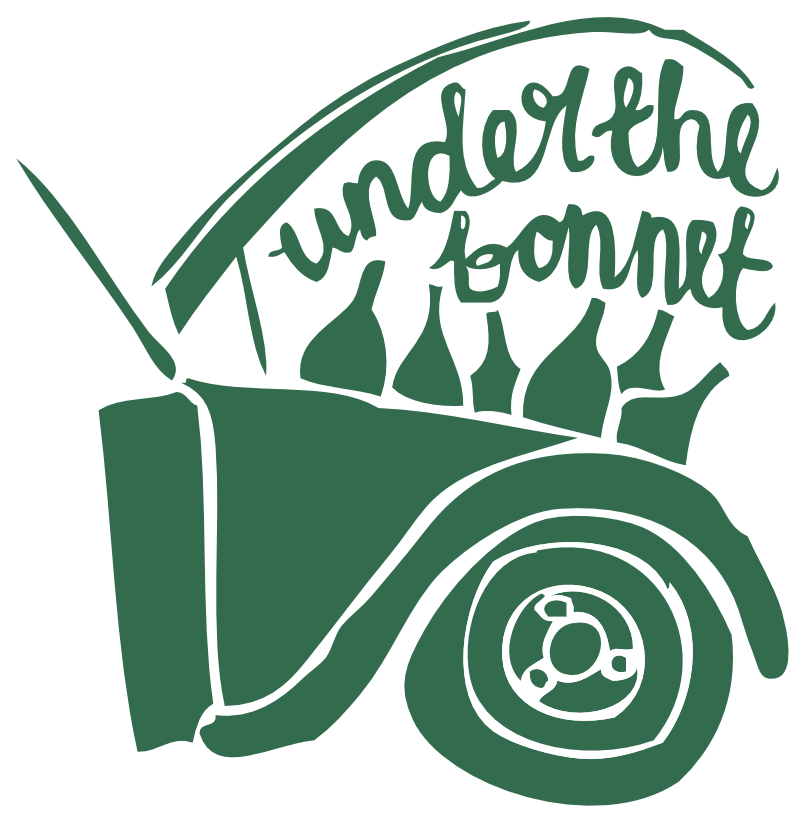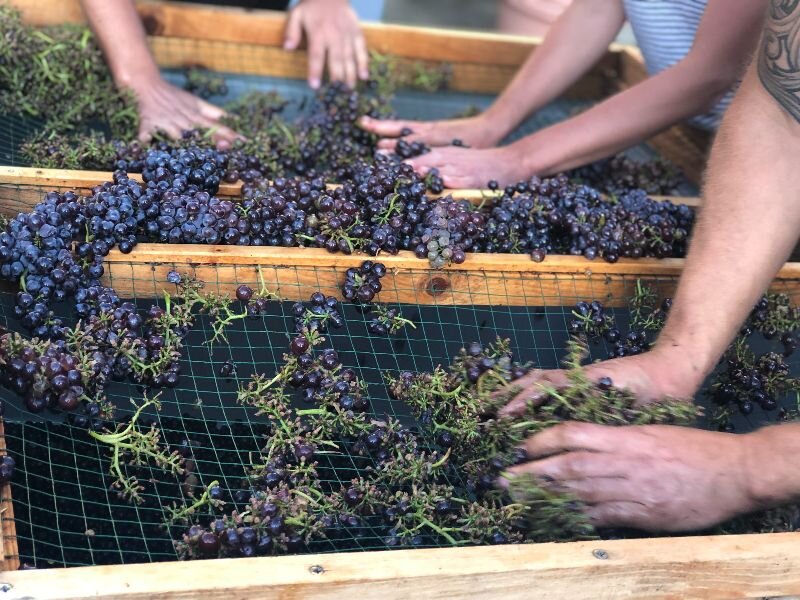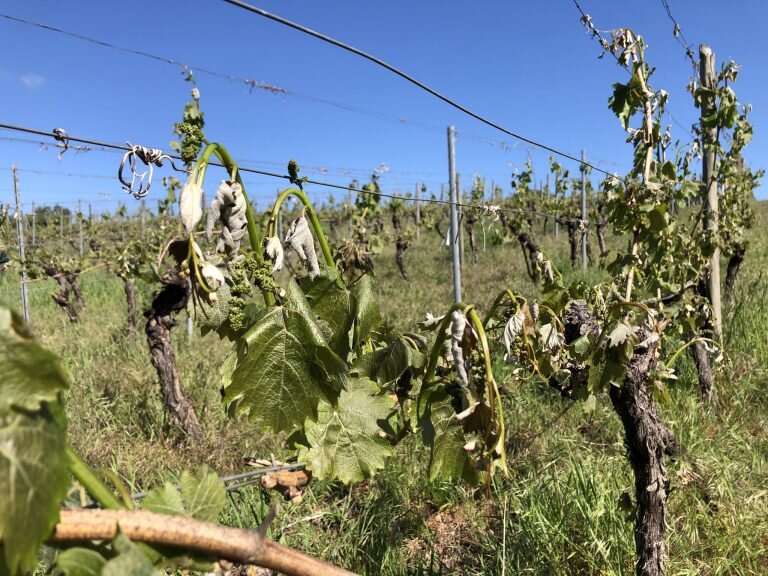2NATURKINDER
Michael & Melanie Voelker
Germany, Franconia, Kitzengen
Things are looking cautiously optimistic over at 2Naturkinder. A good year is well-needed after their 2020, and one could be on the cards.
After the late frost event of last year, this has been the slowest start to a season since Melanie & Michael Voelker returned to Kitzingen nearly a decade ago.
Buds finally broke towards the end of April, although the lack of rain received thus far does spell another drought for summer.
We're already past the date on which frost wiped out 80% of the 2020 yields (May 12th) and historically, May 15th is the last date of the season a major frost can be expected. Never say never, but our fingers are crossed for the Voelkers this year.
We've just received a handful of the triumphant 2019's from Melanie & Michael, the year in which they learnt to handle the drought that is becoming a regular fixture in Central Europe.
We caught up with Michael in early April before bud break as he finished hammering their last post into a new 1 hectare vineyard. 1000 posts and 25km of wire required to build a trellising frame for the young plants!
Is there any impact to the vines after a major frost event like you saw last year?
”Potentially, it depends what you did to the vine a little bit. The whole bud break process comes from the plants reserves: it doesn't have leaves yet so the engine isn't really running - no photosynthesis - so it uses that reserve for the fist bud break. When you have frost it needs to do that again, so it depletes even more of its reserves.
”It's going to be interesting to see, but we do try to not push them too hard. I hope it's going to be alright, there will be an impact for sure. Not all the plants have the nice strong canes that they normally would have had, which makes it tricky to prune. But we'll see if we've reacted well!
”Another thing we've had is not enough rain so far. If it's not gonna be a rainy April then we need to plan for another dry summer. So the next drought is almost certainly ahead. We've started getting used to that. It just means you have to be a bit more moderate with yields which are relatively low here already. It's not our first, so we are learning to adapt.
It can lead to fermentation problems if you don't manage it well because you can have a lack of amino acids in the juice. That was a huge lesson in 2018 for a lot of European growers when we had the first big drought. “
Could you tell us a little bit about the 2019 Fledermaus Weiss & Fledermaus Rot that have just landed?
”I actually tried the 2016 and 2017 vintages a couple of days ago and they were quite funky! Depending on your definition of funkiness I suppose. They're not really my favourite vintages. 2018 was super clean and precise, like 2015. One of the reasons being that I reduced the quantity and sorted out a few batches that I didn't fully trust, saved them in reserve for the Vater blend which we allow a little sulphur to be added to if needed. I don't want to add any sulphur to Fledermaus.
”So now the Fledermaus is just three batches: our favourite big barrel of Muller Thurgau, a medium sized barrel of Sylvaner and a small tank of Riesling. 2019 is a very similar blend to 2018, Melanie says it's even better but I struggled to compare them!
”The Sylvaner has a little skin-contact overnight before we press. The challenge with Sylvaner is it's a very pectine-heavy flesh, so you have to press long and hard if you do direct. If you give it a little more time you get the natural enzymes populating the must, and then it's a little easier to press. It gives it a different fruitiness to a hard direct press.
”The red one, like always is a single vineyard Pinot Meunier. 2019 were mostly very healthy grapes, just with a little bit of heat damage so it was a low yield. Just one 1200 litre tank for almost 8000 square metres!
”They were hand de-stemmed on boards like the Jura, and left in boxes for a week of semi carbonic maceration before pressing. That's always just finished in a tank.”
How is the bat conservation project going?
”The bats are if anything, in decline. We still get our guano, it will keep going into the vineyard. But in general they're going down in the area. We just have super small colonies in the area, but tiny families of like 15 different species. But they don't live in big colonies, they're in smaller groups.
”Where we get our guano from though, you can see a continuous drop in numbers because they're just less food for them. Fewer insects to eat. The whole bat thing; when you support that species you're supporting a whole ecosystem. The bats can only thrive if there's enough caterpillars, the caterpillars can only survive if there's enough butterflies reproducing. They're really an indicator of an ecosystem. It's quite sad really.
”They're certainly around though; a week ago I was terrified, working late down here in the winery. I walked back up to our house and there was a huge bat that surprised me in the office. I tried for 2 hours to help him out but it didn't want to leave. I had to just leave the window open and hope for the best!
”I really do like the guano as a fertiliser, especially for that vineyard where it's incredibly tricky to get compost in. Pinot Meunier & Muller Thurgau need more of a nitrogen supply than other varieties; that was definitely something I learnt as I stopped tilling in 2016.
”Some varieties don't really care about that, there's enough nitrogen they can access. But Pinot Meunier, Muller Thurgau & Domina don't handle that too well. They need more nitrogen supply and that's tricky without tilling. That lack of nitrogen is something that can cause instability, mousiness risks. So they get fed batshit!”
JUST LANDED
WHITE
2019 - Landwein - Vater & Sohn - Muller Thurgau, Silvaner, Bacchus
2018 - Landwein - Fledermaus Weiss - Muller Thurgau, Silvaner, Riesling
SKINS
2018 - Landwein - Weinschwärmer - Pinot Gris, Riesling
ROSE
2019 - Landwein - Black Betty - Domina
RED
2019 - Landwein - Fledermaus Rot - Pinot Meunier
2017 - Landwein - Spatburgunder - Pinot Noir
For wholesale enquiries please email hello@winesutb.com







